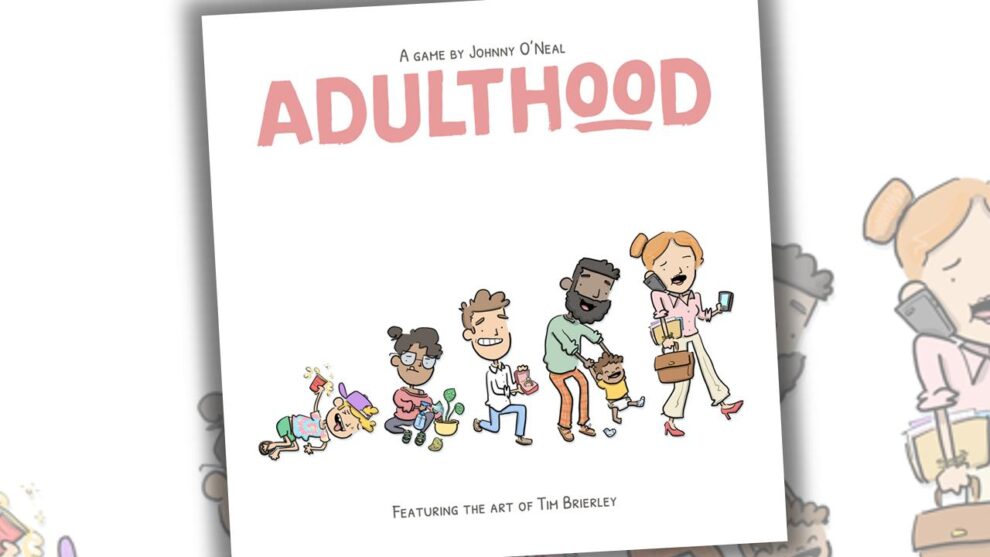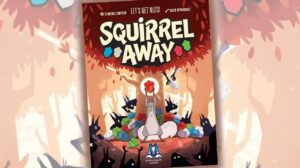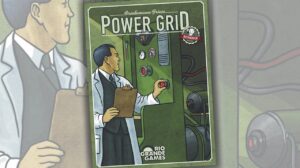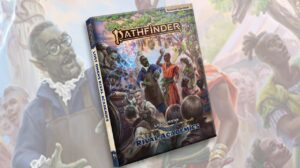Disclosure: Meeple Mountain received a free copy of this product in exchange for an honest, unbiased review. This review is not intended to be an endorsement.
Growing up in a family of six we basically had two staple board games: Pay Day and The Game of Life. The former instilled a vast distrust of the lottery in me at a young age and the latter taught me about the inevitability of taxes. Either way, I have a fondness for both games, even if they don’t live up to modern board game expectations. Adulthood, Johnny O’Neal’s latest offering from Brotherwise Games, does its best to capture the unexpectedness of life and those nostalgic vibes.
Adulthood Overview
Just like the real world, Adulthood is about investing your Time, Energy, and Money into various activities that will maximize your Happiness and Impact. Something new is always on the horizon whether it be a new love interest, exciting career, or worthwhile experiences that shape the path of your life’s journey.
During a player’s turn, they assign their purple Time tokens to any activities on their player board. Additionally, if any of the actions have other costs associated with them, they must also be paid at this time. Once actions are declared, each one is played out in whatever order the player sees fit, gaining any relevant resources or cards as indicated.
Once actions have been taken, the player drafts a card from the Market, representing their growth as a human being on this big, blue marble. Afterwards, they can play any number of cards from their hand provided that they have the necessary prerequisites and costs to pay for them.
When you play a Community, Wellness, Career, or Leisure card, it replaces the action or card that is already there. The replaced cards go into your Experience stack, which serves as a memory lane of how your life took shape, but also exhibits the various icons that you possessed as well.
As players move their scoring markers to the right on the Impact track and to the left on the Happiness track, they will sometimes cross into a space with a squiggly square surrounding it. This represents a Life Event, requiring that player to take the top card of the Life Events deck and resolve its effect. You really get to see the volatility of life in full-swing, because as much as you’d like to plan out a perfect turn, sometimes life just gets in the way and ruins everything.
The moment any player’s scoring markers cross each other on the two tracks, the end of the game is triggered. Play continues until everyone has taken the same number of turns, and then the scores are tallied up. Certain red tokens like the thumbs down or sad face will be negative points, whereas matching sets of icons nets you bonus points. Each player also holds Values throughout the game, secret from the other players, that offer extra ways to increase their score. Highest score is the winner!
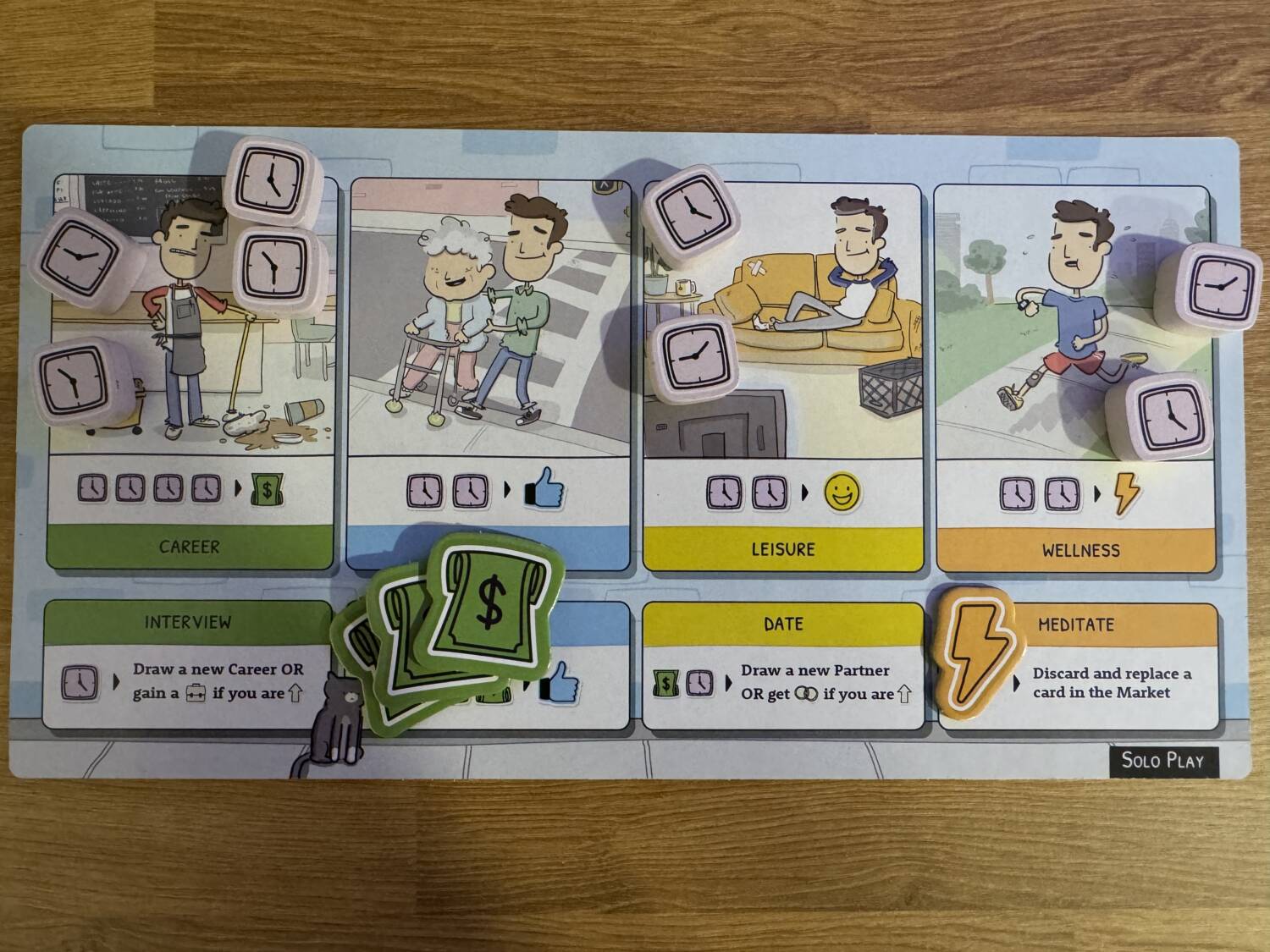
Adulthood: When Life Gives You Lemons
Taking a single glance at the box for Adulthood, you’d expect a lighthearted game about the trials and tribulations of no longer being a kid. That’s exactly what you get. It really shines through the carefree art of the talented Tim Brierley, whose whimsical illustrations are unique on every card and often depict some kind of silliness or frivolity. My favorite is probably the Non-Profit card which shows a group of people celebrating a profit graph taking a major plunge.
Adulthood has a very simple and satisfying gameplay loop that gets the table up and running in short order. Especially on the first few turns, having limited choices of what to do eases any kind of analytical burden. Even later in the game where you may have access to a few more spaces to spend resources, I never felt overwhelmed thanks to how the game presents their costs—since everyone starts from the same baseline, nearly every card that you get will be a straight upgrade over the existing actions.
There was a tangible feeling of progression in every game, despite always wishing that you had more time, money, energy to do even more. If that doesn’t encapsulate my day-to-day, I don’t know what else would. I also really enjoyed that you can spend Energy tokens as if they were time, allowing you to do more than usual on a turn if you have a few saved up.
The other usage for Energy tokens is to spend them to acquire cards further down in the Market, but most of the time it felt like it wasn’t worthwhile to do so. In general, resources have some scarcity to them, and you have to equate taking cards on the right side of the Market as spending two Time tokens. In a game where you only get eight of those each turn, it seems like a hefty price to me. It is much more common to settle for the free card during the early game, and spend surplus tokens later on.
Speaking of tokens, I was surprised at how huge some of these are. When you get married, become a grown-up, and get promoted, you acquire these gigantic tokens to show off your accomplishment. Even the other tokens have a pleasant bigness to them that makes them easy to grab and pass to the supply, which you will be doing often. These tokens could have easily been simple, boring circles with iconography, but instead they have a personality all their own.
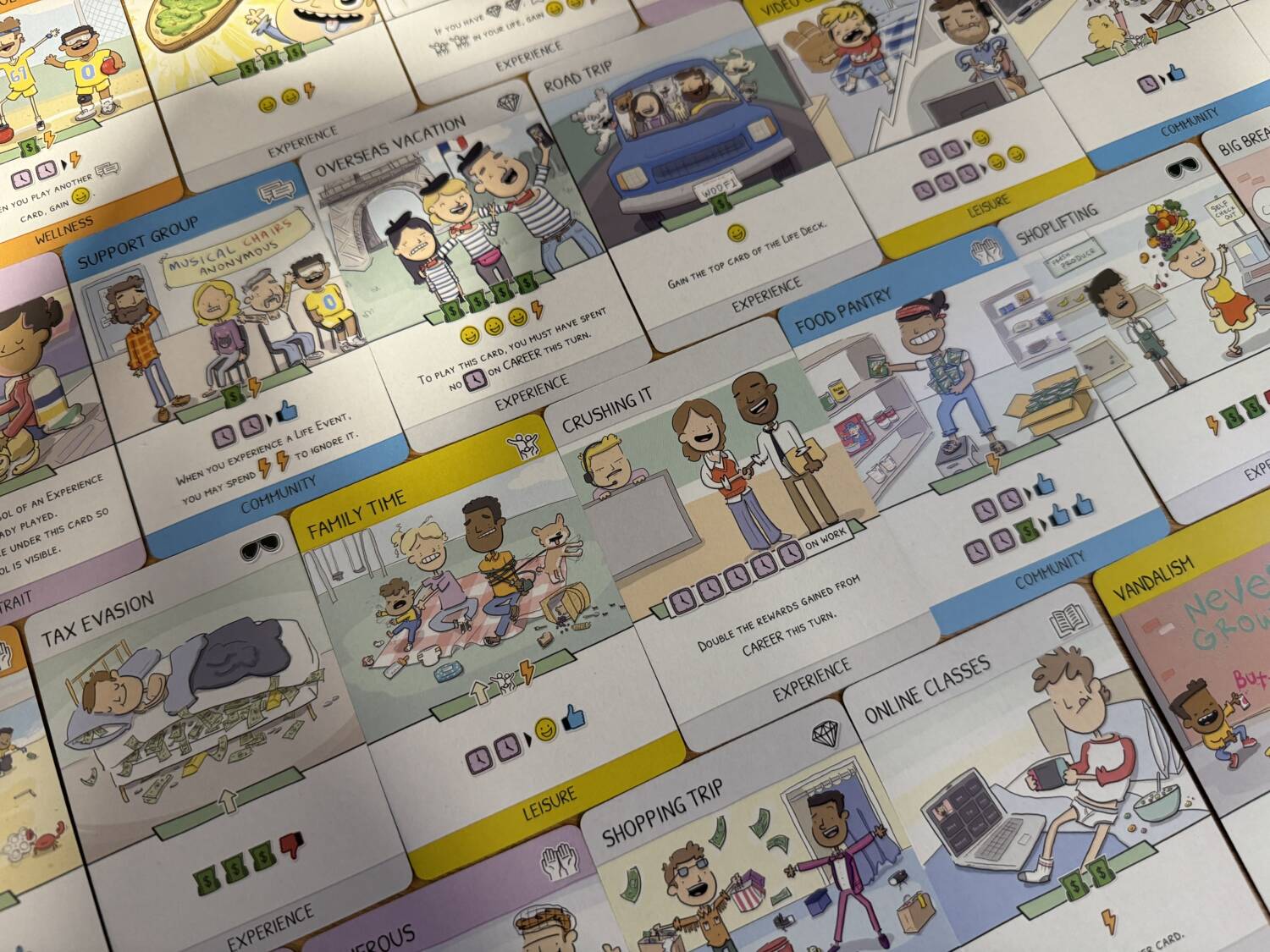
Adulthood really shines with the Life Event cards, and it’s a shame that you could only draw a maximum of four in a game. In most games, you’ll only draw three. My guess is that too many Life Events made the game feel too chaotic, but it also seems thematic to throw things at the players to see how they react to them. Given how they are structured, it’s also easy to game the system and work towards scoring on the other track if you’re close to triggering a Life Event, even if it’s a random effect. I’d like to see some more randomization on that front, like earning one based on thresholds of cards played.
I also recommend having players allocate their resources simultaneously, getting ready for their turns ahead of time. It’s noted in the rulebook, but you can cut down the gameplay time if people aren’t waiting around for that initial step, and it reduces personal downtime as well.
In the initial printing of the game there are also cards that refer to the Life deck, which doesn’t exist. That was renamed to the Adulthood deck in the final cut, although this should be fixed in subsequent printings. There also exists ambiguity in the rules around things like ‘work’ which should just refer to your current Career, or the difference between losing a card or discarding a card. The former relates to a card in your tableau, while the latter is from your hand. Apparently a FAQ is in the works to smooth some of these issues over, but it’s unclear whether that will be something incorporated into the rules for future printings.
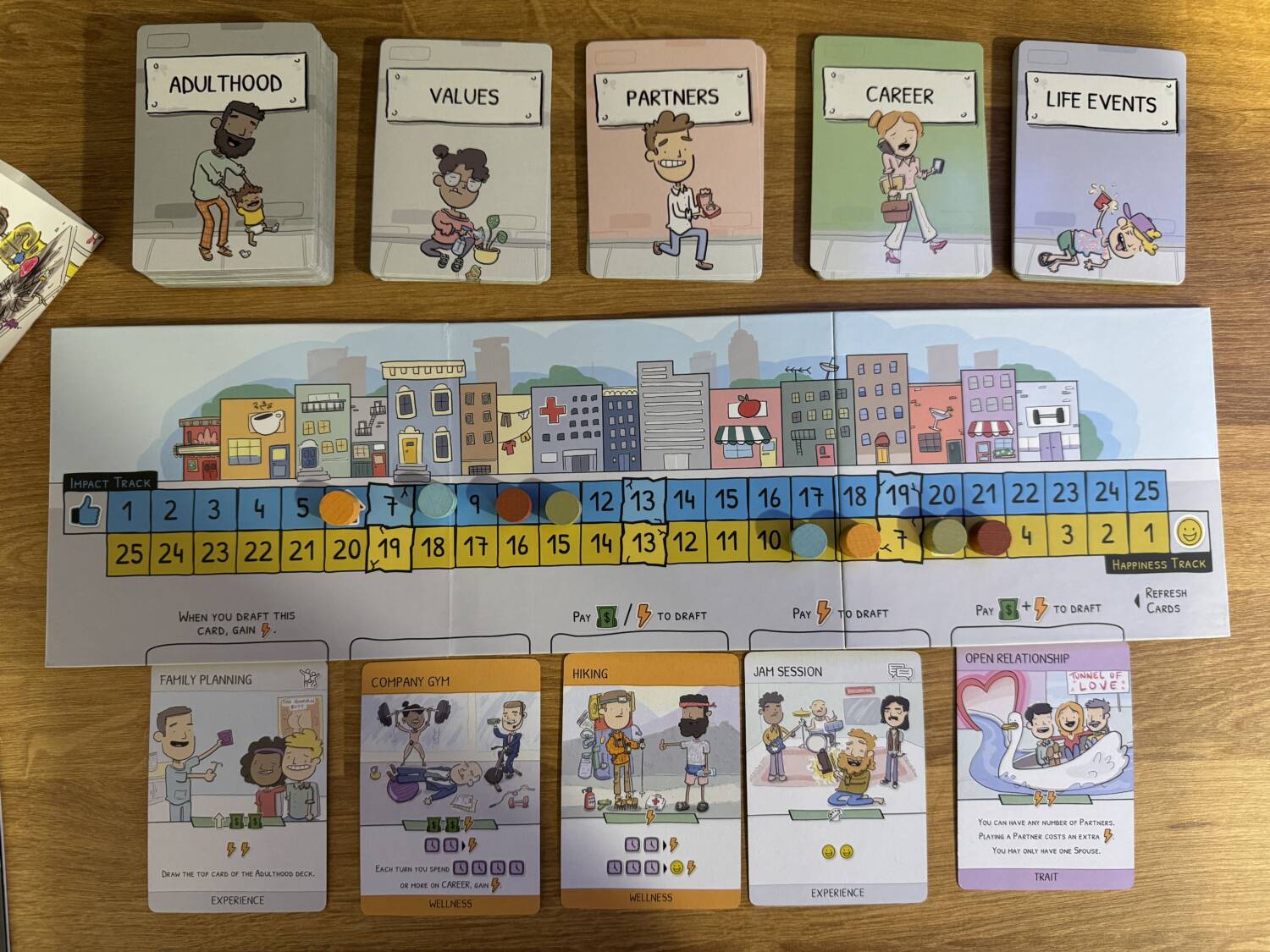
Adulthood: Make Lemonade
There isn’t anything particularly novel about Adulthood. There aren’t any mechanics that stand out or are unique to the game. Its strength lies in the presentation and how it offers a humorous slant to even the less glamorous aspects of life. There is an obvious amount of care and attention to detail that makes this game feel like a relatable homage to the world around us, whether you’re a spry youth or someone who’s been around the block once or twice.
I feel like I should also comment on the solo mode, which definitely feels more optimization-dependent than playing with others. The number of turns you take is limited, so it becomes very important to spend your resources to increase your positions on the tracks each turn or else you likely won’t be very successful. You can also circle your position on the Solo Achievements cards, which replace the Values cards in that mode. It’s not something that I’ve done because I can’t bear to mark up these beautiful cards.
Playing solo is enjoyable, but there is much more fun to be had sharing in your life’s journey with others, experiencing each others’ pains and gains together. It’s a tighter game with little wiggle room for venturing off on experimental solo projects.
I was looking for a game that would hit me with bricks of nostalgia and Adulthood delivered on that front. It knows exactly what it is setting out to be and doesn’t deviate from the script. It’s lighthearted, good-natured fun that sings a love letter to our one shared experience—growing up.


